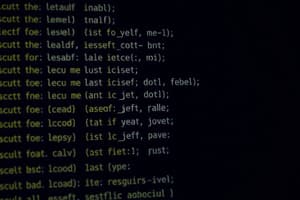Podcast
Questions and Answers
Variables can hold more than one value at a time.
Variables can hold more than one value at a time.
False (B)
Assignment requires at least two statements.
Assignment requires at least two statements.
True (A)
Initialization is the process of assigning a value to a variable after it has been defined.
Initialization is the process of assigning a value to a variable after it has been defined.
False (B)
There are only three ways to initialize variables in C++.
There are only three ways to initialize variables in C++.
Default initialization occurs when an initializer is provided.
Default initialization occurs when an initializer is provided.
The = operator is called the assignment operator.
The = operator is called the assignment operator.
Variables must be initialized when they are defined.
Variables must be initialized when they are defined.
The value on the right-hand side of the = operator is copied to the variable on the left-hand side.
The value on the right-hand side of the = operator is copied to the variable on the left-hand side.
Default initialization always performs some initialization and leaves a variable with a determinate value.
Default initialization always performs some initialization and leaves a variable with a determinate value.
Copy initialization is a form of initialization that makes use of curly braces.
Copy initialization is a form of initialization that makes use of curly braces.
Direct initialization is used to initialize complex objects with class types.
Direct initialization is used to initialize complex objects with class types.
List initialization is also known as 'uniform initialization' or 'brace initialization'.
List initialization is also known as 'uniform initialization' or 'brace initialization'.
List initialization has the benefit of allowing 'narrowing conversions'.
List initialization has the benefit of allowing 'narrowing conversions'.
C++17 introduced a new form of initialization called 'list initialization'.
C++17 introduced a new form of initialization called 'list initialization'.
Copy initialization is the most efficient form of initialization for all types.
Copy initialization is the most efficient form of initialization for all types.
Direct initialization is never used in modern C++ due to its inefficiency.
Direct initialization is never used in modern C++ due to its inefficiency.
Flashcards are hidden until you start studying
Study Notes
Variable Assignment
- The
=operator is used to assign a value to a variable in a separate statement, a process called assignment or copy assignment. - The value on the right-hand side of the
=operator is copied to the variable on the left-hand side. - Assignment overwrites the previous value of the variable.
Initialization
- Initialization is the process of specifying an initial value for an object when it is defined.
- Initialization combines the definition and assignment of a variable into one step.
- The syntax used to initialize an object is called an initializer.
Forms of Initialization
- There are six basic ways to initialize variables in C++.
- Default initialization: no initializer is provided, leaving the variable with an indeterminate value.
- Copy initialization: an initial value is provided after an equals sign, copying the value into the variable.
- Direct initialization: an initial value is provided inside parentheses, initially used for efficient initialization of complex objects.
- List initialization: the modern way to initialize objects using curly braces, with added benefits such as preventing "narrowing conversions".
Key Points
- Normal variables can only hold one value at a time.
- Initialization can be combined with definition, saving a separate assignment step.
- Initializing a variable with a value overwrites any previous value.
Studying That Suits You
Use AI to generate personalized quizzes and flashcards to suit your learning preferences.




